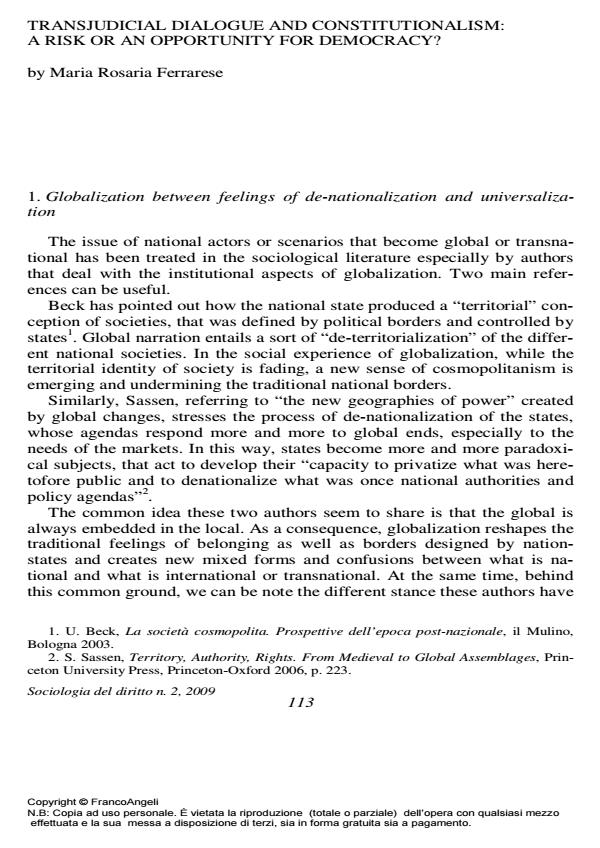Transjudicial dialogue and constitutionalism: a risk or an opportunity for democracy?
Titolo Rivista SOCIOLOGIA DEL DIRITTO
Autori/Curatori Maria Rosaria Ferrarese
Anno di pubblicazione 2009 Fascicolo 2009/2
Lingua Italiano Numero pagine 26 P. 113-138 Dimensione file 354 KB
DOI 10.3280/SD2009-002008
Il DOI è il codice a barre della proprietà intellettuale: per saperne di più
clicca qui
Qui sotto puoi vedere in anteprima la prima pagina di questo articolo.
Se questo articolo ti interessa, lo puoi acquistare (e scaricare in formato pdf) seguendo le facili indicazioni per acquistare il download credit. Acquista Download Credits per scaricare questo Articolo in formato PDF

FrancoAngeli è membro della Publishers International Linking Association, Inc (PILA), associazione indipendente e non profit per facilitare (attraverso i servizi tecnologici implementati da CrossRef.org) l’accesso degli studiosi ai contenuti digitali nelle pubblicazioni professionali e scientifiche.
Transjudicial Dialogue and Constitutionalism: A Risk or an Opportunity for Democracy? - After briefly explaining how constitutional dialogue works and has mostly been elaborated, together with how it is encouraged and made possible by some of the institutional characteristics of the judiciary, this paper addresses a specific issue: the link between the position adopted by the courts with regard to this practice and the different kinds of legitimisation which they refer to, whether democracy or constitutionalism. Legitimacy may be based more on democracy, with the idea that national sovereignty is its almost exclusive source, or on the idea that, in matters of rights, universal standards may or must pass through different democracies. As usual parlance is of course about "constitutional democracies", it reconciles the potential opposition between the two aspects. However, globalisation, with the challenges it sets towards national sovereignty, is strengthening this opposition, pushing it toward the one or the other aspect. Courts and especially constitutional courts are thus becoming the places where decisions are made about the ambivalence between the risk of de-nationalising national constitutional law and the opportunity to take part in creating new cosmopolitan forms of law and universalising a constitutional protection of fundamental and human rights. Two possible answers to this ambivalence are highlighted by focusing particularly on the example of two national constitutional courts, that of South Africa and that of the United States, starting from their different attitudes towards involvement in the constitutional dia- logue. Their different, even opposite, ways of approaching transnational dialogue lead to paradoxical results.
Maria Rosaria Ferrarese, Transjudicial dialogue and constitutionalism: a risk or an opportunity for democracy? in "SOCIOLOGIA DEL DIRITTO " 2/2009, pp 113-138, DOI: 10.3280/SD2009-002008